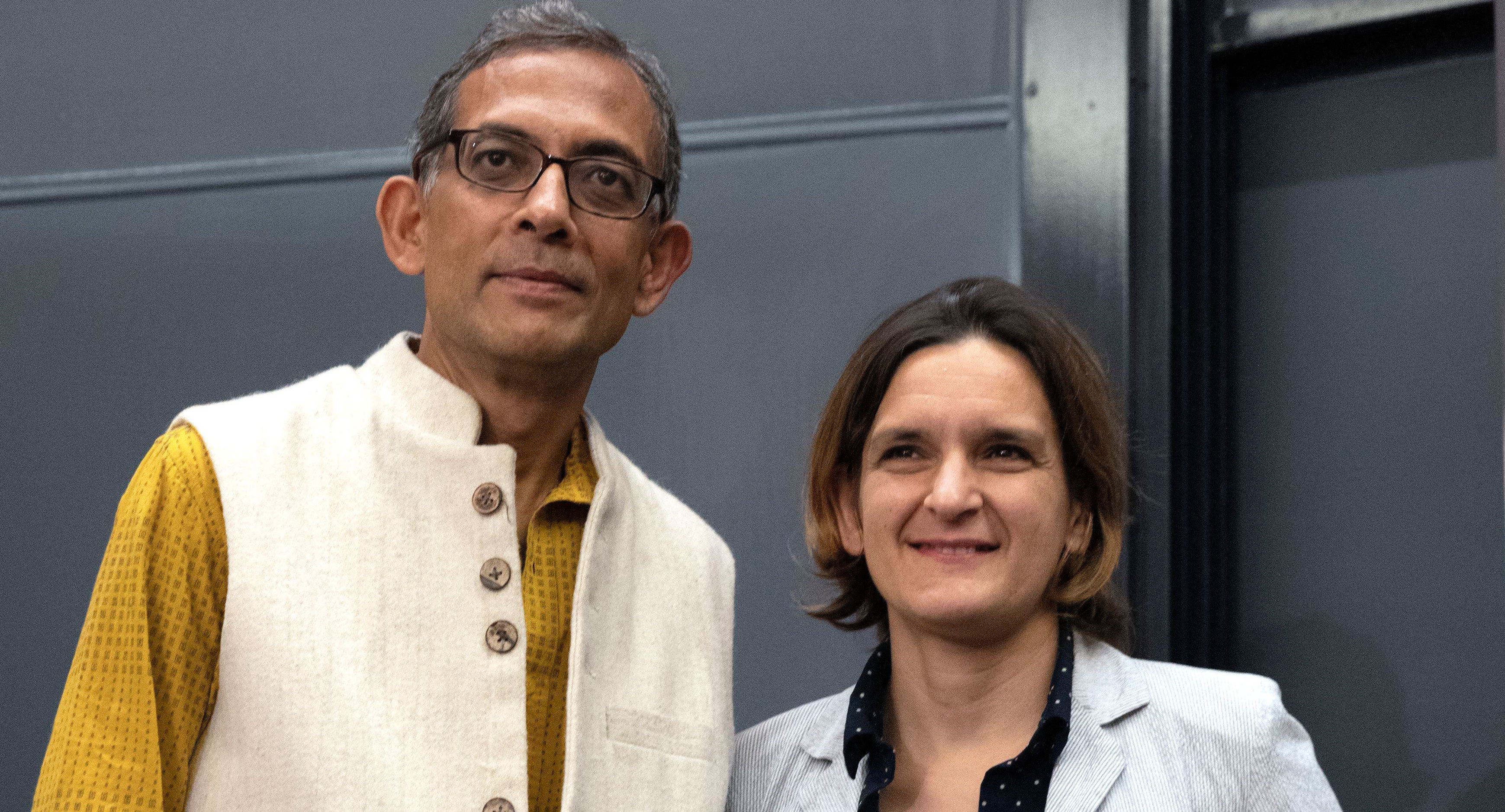Sir — The coral reefs in the Gulf of Mannar off the coast of Tamil Nadu and Palk Bay had suffered heavy damage by bleaching earlier this year. Surprisingly, however, many of these have sprung back to life within a couple of months. This is heartening — it shows that all is not lost yet. Nature is resilient and, with a little help from mankind, it can nurture itself back to health. Bleaching occurs primarily because of rising sea surface temperatures. It is high time that we recognize the importance of coral reefs — the foundation of underwater ecosystems — and make an effort to save them.
Parijat Ganguly,
Calcutta

Abhijit Banerjee with Esther Duflo after a news conference at Massachusetts Institute of Technology in Cambridge on October 14, 2019 (AP)
Glorious feat
Sir — The awarding of the Nobel Prize for economics to Abhijit V. Banerjee, Esther Duflo and Michael Kremer has come at a time when ideas that are different from the norm are not encouraged (“Noble ideas”, Oct 17). Banerjee’s ideas are meant for the development of low-income communities. His work seems to make a distinction between economic development and economic growth. Change in the social structure is a prerequisite
for economic development rather than focusing solely on economic growth. In the Indian context, these structural changes include better healthcare facilities, educational avenues and work environments.
It will be interesting to see how governments utilize Banerjee’s concepts in order to tackle poverty. It is essential for policymakers to adopt ideas originating from academia to address such complex socio-economic issues.
There is reason for Calcutta to rejoice: the city is now associated with six Nobel Prize recipients.
Jiju Mariam Thomas,
Barrackpore
Sir — Abhijit Banerjee has, through his work, contributed substantially to alleviating poverty. He deserves the Nobel Prize, but the question is, will this bring any real change to the country? Will the government adopt the policies suggested by him? The benefits of achievements in other fields, such as physics or medicine, reach ordinary people in a gradual manner. But economics is a field where there is hardly any change in policy even when an economist establishes a theory and achieves international acclaim for it. It seems to be the policy of governments to ensure that the poor remain poor; otherwise, it would hinder their political agenda. Winning honours for theories, no matter how path-breaking, will be redundant as long as governments refuse to put them to practical use.
Abhijit Chakraborty,
Howrah
Sir — Although Abhijit Banerjee, the India-born economist, deserves to be congratulated for bagging the prestigious Nobel Prize for economics, one must note that he, like the previous economics Nobel laureate of Indian origin, Amartya Sen, had also migrated from India to the United States of America.
It is unfortunate that the achievements of Sen and Banerjee could not take place in India, although they focus on ways to decrease poverty in countries like India. Efforts should be made to ensure that promising intellectuals no longer have to leave the country in order to do their work. This would make Indians even prouder of their country.
R. Sekar,
Visakhapatnam
Sir — When will the Indian media — most of whom refer to the Nobel laureate, Esther Duflo, as Abhijit Banerjee’s wife — recognize the achievements and credibility of a successful woman and not undermine her contributions? Duflo’s research is no less significant than Banerjee’s. Yet the media do not refer to Banerjee as the husband of Duflo.
This trend can be seen on social media too. Does this not abet and reinstate the patriarchal culture ingrained within us? It reflects how people are taught to celebrate the achievements of a man while ignoring that of a woman, even if she is worthy of equal honour and appreciation. It strengthens the regressive notion that a married woman’s life and achievements are nothing but a shadow of those of her husband. This is unacceptable, as it demeans the concept of equality in marriage. The media should rethink their stance.
Swastisha Mukherji,
Calcutta
Sir — The internet seems to be a little too excited about Abhijit Banerjee’s achievement. His work should certainly be appreciated for its content. But it was amusing to see people going overboard in claiming him as one of their own.
Students from the school, the college and the university he attended are all proud on his behalf. So are Bengalis and Indians in general. One only hopes that each one of us decides to work as earnestly as Banerjee to make a difference in the world instead of basking in reflected glory.
Noyonika Sen,
Calcutta










